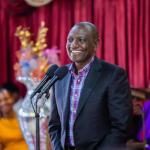The question of what constitutes sufficient and satisfactory public participation in the legislative process took center stage during the hearing of the 2023 Finance Act appeal this week.
Busia Senator Okiya Omtatah, Advocate Ochiel Dudley, and Evans Ogada, representing Siasa Place and Tribeless Youth, argued before the Supreme Court judges on why the Finance Act 2023 should be overturned. They urged the court to mandate that Parliament must provide reasons for either adopting or rejecting proposals received during the public participation process.
Omtatah and his colleagues highlighted that their clients made 58 submissions, of which only four were considered. Two were marked as rejected without any explanation given. “When there are competing views, you need to give reasons so that the public understands why proposals were either accepted or rejected,” Dudley said.
They requested that the Supreme Court uphold the Court of Appeal’s decision from July 31, which imposed a broad scope of public participation and nullified the Finance Act, 2023.
Appellate Judges Kathurima M’inoti, Agnes Murgor, and John Mativo had ruled that the sections introduced after public participation to amend various laws—including the Income Tax Act, Value Added Tax Act, Excise Duty Act, Retirement Benefits Act, and Export Processing Zones Act—were unconstitutional due to the lack of additional public participation.
The judges also stated that Parliament is required to provide reasons for adopting or rejecting public proposals. “Failure to comply with this constitutional requirement renders the entire Finance Act 2023 unconstitutional,” they said.
This ruling was a focal point for both state and opposing advocates. Chief Justice Martha Koome also questioned the parties about the Court of Appeal’s decision, which seemed to set new standards for public participation. “It appears the Court of Appeal raised the standard or changed the yardstick and introduced new parameters. Is this a breach of public participation requirements, or was it a new framework to raise the bar?” the CJ asked.
In response, Senior Counsel Kiragu Kimani and Professor Githu Muigai, representing the Attorney General and the CS Treasury, argued that there is no requirement for Parliament to provide reasons for adopting or rejecting proposals.
Advocate Issa Mansour, representing the National Assembly and its speaker, contended that the Court of Appeal had deviated from the principles established in the British American Tobacco (BAT) case. This case had addressed concerns about public participation in the implementation of tobacco control regulations, with the Supreme Court ruling that while public participation must be genuine, it does not require acceptance of all proposals and views.
Mansour argued that the amendments in the challenged Finance Act were based on input received during public participation, reflecting a transparent and inclusive legislative process. He criticized the Court of Appeal for deeming the inclusion of 18 new provisions from the public participation process as unconstitutional, asserting that the appellate judges had misunderstood the practical implications.
“Requiring every amendment to undergo public participation and additional readings would bring the legislative process to a halt,” he said.
On the other hand, Ochiel Dudley and Evans Ogada argued that the process remained unconstitutional because, in their view, the new provisions were not subjected to public participation.
The appeal hearing, initiated by the CS Treasury and AG on Tuesday, saw the state pleading with the court to overturn the decision that nullified the 2023 Finance Act. Senior Counsel Prof. Githu Muigai, Kiragu Kimani, Mahat Somane, and Paul Nyamodi highlighted the adverse effects of invalidating the Act, including debt defaults due to insufficient revenue, suspension of government projects, and inability to pay government officers, judges, and independent commission members.
They emphasized that the government’s purpose is to deliver services to its citizens, which is impeded without the necessary legislation.
They asked the Supreme Judges to consider crafting orders that would enable the state to continue delivering services to the public if they agreed with the decision of the appellate court that invalidated the Act.


